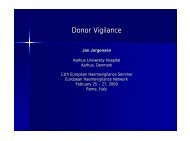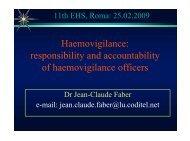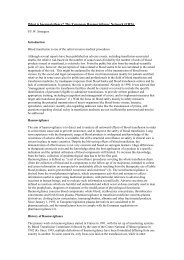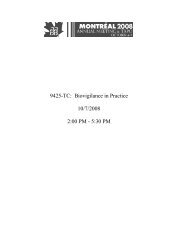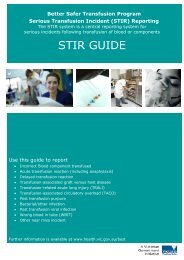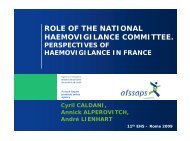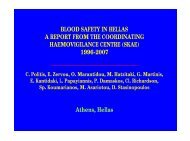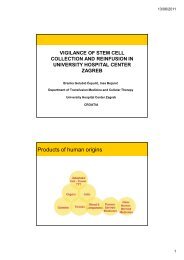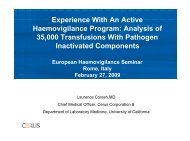SHOT Annual Report 2009 - Serious Hazards of Transfusion
SHOT Annual Report 2009 - Serious Hazards of Transfusion
SHOT Annual Report 2009 - Serious Hazards of Transfusion
You also want an ePaper? Increase the reach of your titles
YUMPU automatically turns print PDFs into web optimized ePapers that Google loves.
All <strong>of</strong> the errors in this group were preventable if the person taking the sample had adhered to NPSA guidelines and local<br />
Trust policy for taking transfusion samples. The absence <strong>of</strong> this adherence led to 3 patients being given incompatible<br />
components, resulting in 1 fatality and 1 life-threatening reaction. Despite staff completing their blood transfusion<br />
competencies, work pressures can lead to staff ‘cutting corners’ and losing sight <strong>of</strong> the reasons for completing a<br />
comprehensive ID check. 19<br />
Special requirements not met (SRNM) n = 154<br />
The total number <strong>of</strong> cases in this section (clinical and laboratory) has increased this year to 154 compared with 117 last<br />
year. There are 87 cases with a primary clinical cause <strong>of</strong> the omission and 67 cases in which the responsibility lay within<br />
the hospital transfusion laboratory.<br />
This year 81 male and 70 female patients did not have their special requirements met. In 3 reports the gender <strong>of</strong> the<br />
patient was not documented. A total <strong>of</strong> 25 patients were < 18 years old. There were 2 < 4 weeks old, 4 aged 4 weeks<br />
to 1 year, 17 aged between 1 and < 16 years, and 2 aged 16 to < 18 years. The remaining 129 patients were adults<br />
with an age range <strong>of</strong> 18 to 87 years.<br />
Table 16<br />
Special requirements not met, showing proportion <strong>of</strong> primary clinical and primary laboratory errors<br />
Category <strong>of</strong> error (SRNM)<br />
No. <strong>of</strong> clinical<br />
cases<br />
No. <strong>of</strong> laboratory<br />
cases<br />
Failure to consult patient notes (clinical or laboratory), or failure <strong>of</strong> communication<br />
from clinicians to laboratory, or poor knowledge <strong>of</strong> clinician<br />
84 40<br />
Irradiated component 69 22<br />
CMV negative component 5 10<br />
CMV negative and irradiated 5 4<br />
HLA matched platelets 4<br />
HLA matched and CMV negative 1<br />
BMT group change and irradiated 4<br />
Poor knowledge and/or failure to recognise the special needs <strong>of</strong> a specific patient<br />
group (clinical and laboratory)<br />
3 27<br />
Phenotyped component 17<br />
MB treated FFP 7<br />
Apheresis platelets not given to a patient < 16 3<br />
Not using blood warmer 2<br />
Latex allergy missed 1<br />
TOTAL 87 67<br />
SRNM following clinical errors or omissions n = 87<br />
As in previous years the majority <strong>of</strong> cases where special requirements were not met related to requests for patients<br />
who required irradiated components, but this requirement was not made clear to the laboratory by the clinical staff at<br />
the time <strong>of</strong> requesting the component. A smaller number <strong>of</strong> cases related to the non-communication <strong>of</strong> a requirement<br />
for CMV negative components or requiring both specifications. Generally, it appears from the information supplied to<br />
<strong>SHOT</strong> that the doctor ordering the components either did not know <strong>of</strong> the criteria for irradiated or CMV negative products<br />
or was not familiar enough with the patient to realise that this was necessary.<br />
7. Incorrect Blood Component Transfused (IBCT) 39




